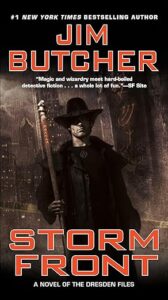| We’ve now posted a total of 17 book reviews. |
| Available now at the Amazon.com website … CLICK HERE! |
| Any and all books purchased through our website cost you nothing extra, but do help support our ongoing efforts. |
 Jim Butcher’s “Storm Front” kicks off The Dresden Files with a snappy promise: what if a classic hardboiled detective novel put on a trench coat lined with sigils? The answer is a brisk, smoky blend of urban fantasy and noir set in present-day Chicago, narrated by professional wizard and private investigator Harry Dresden. The case on his desk spirals fast, but the book’s real hook is voice—first-person, wry, a little bruised—and a tone that treats the supernatural not as glitter but as plumbing: leaky, dangerous, and subject to rules. Jim Butcher’s “Storm Front” kicks off The Dresden Files with a snappy promise: what if a classic hardboiled detective novel put on a trench coat lined with sigils? The answer is a brisk, smoky blend of urban fantasy and noir set in present-day Chicago, narrated by professional wizard and private investigator Harry Dresden. The case on his desk spirals fast, but the book’s real hook is voice—first-person, wry, a little bruised—and a tone that treats the supernatural not as glitter but as plumbing: leaky, dangerous, and subject to rules.
As a mystery, “Storm Front” works like a procedural with extra voltage. The investigation ticks through interviews, scene work, and a tangle of competing agendas, while the action sequences feel cleanly staged—kinetic without losing spatial sense. Butcher keeps the pages turning with short chapters, crisp clifflets, and a tempo that alternates banter with menace. Chicago isn’t wallpaper; the city’s alleys, diners, and rain-shined streets give the plot a lived-in grid. Humor helps: the wisecracks land, not to undercut stakes, but to show how a working pro keeps his nerve when the lights flicker. Worldbuilding is handled with practical restraint. “Storm Front” lays out magic as a system with limits and costs—energy has to come from somewhere, names have power, and big spells leave a bill. The friction between wizardry and technology adds a fun constraint that creates problems at exactly the wrong moment. Institutions exist—the kind that set rules and demand respect—and their presence keeps the book from drifting into “anything goes.” The result is a universe that feels gameable: you learn the tools as the protagonist uses them, not via a lecture. Character dynamics carry a lot of weight. “Storm Front” introduces a lead who’s less invulnerable than stubborn, with a code that reads as lived-in rather than ornamental. Allies and foils—cops, clients, supernatural contacts—arrive with distinct angles and enough grit to keep conversations textured. The partnership beats are especially strong: professional trust is earned through dull work and small risks, not insta-chemistry. Even the comic relief has purpose, leavening the darker material while nudging the plot forward. Across the board, motives tend to be human first, magical second, which keeps the story grounded when the sparks fly. Stylewise, “Storm Front” is pure pulp velocity—muscular sentences, sardonic metaphors, and fight scenes that read like choreography scribbled in the margins of a case file. Some elements reflect the early-series moment: the wisecracking noir gaze can feel a touch dated, and a few beats lean on familiar genre shorthand. But the book’s strengths—momentum, legible magic, and a narrator who earns your attention—more than carry it. As a series starter, it sets the table with confidence and leaves room to deepen everything that matters. If you want an urban fantasy that respects the grind of investigation while delivering fire and thunder when it counts, “Storm Front” is a fast, satisfying introduction—and a nudge to clear your weekend for the next installment. |
